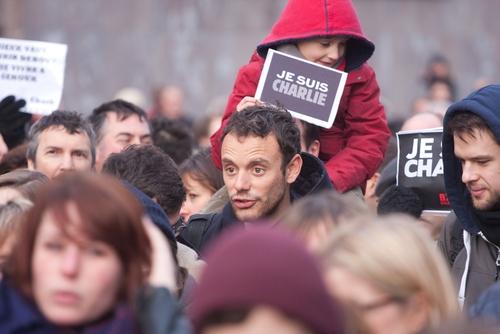It occurs to me that there is a delicious irony playing out before our very eyes, and no one seems to have spotted it, and here it is:
President Bush, using dubious (but largely agreed-upon) intelligence, and inspired by his view – a view some would call “alarmist” – that terrorism is the greatest threat to humanity life and liberty on the planet, went to the UN and called for international movement to depose Saddam Hussein and engage Al Qaeda in a ground war. Some say Bush brooked no debate and suggested that dissent was “unpatriotic.” Those opposed to the war, both outside of the press and from within, cry “why did the press not ask more questions? Why did they simply go along with what Bush said?”
Al Gore, using dubious (but somewhat agreed upon) intelligence, and inspired by his view – a view some would call “alarmist” – that global warming is MAN MADE and the greatest threat to humanity on the planet, has traveled the globe calling for international movement and legislation that will threaten human liberty and whole economies. He refuses to debate, and suggests the press not report upon dissent. Some of his supporters suggest that that dissent on the issue is akin to “holocaust denial.” Those who take a differing view are now crying, “why will the press not ask more questions? Why are they simply going along with what Gore says?”
The difference between the two, of course, is that the press did engage in debate over the Iraq war, they did question it – although admittedly, probably not as strongly as they might have. The press does not engage in debate over Man Made Global Warming, even though the the models, which do not take something as basic as precipitation into their calculations, is unsettled and the science is admittedly complex.
Thus it is refreshing to read this piece by John Christy, co-winner of Al Gore’s Nobel Prize, who writes:
Mother Nature simply operates at a level of complexity that is, at this point, beyond the mastery of mere mortals (such as scientists) and the tools available to us. As my high-school physics teacher admonished us in those we-shall-conquer-the-world-with-a-slide-rule days, “Begin all of your scientific pronouncements with ‘At our present level of ignorance, we think we know . . .'”
I haven’t seen that type of climate humility lately. Rather I see jump-to-conclusions advocates and, unfortunately, some scientists who see in every weather anomaly the specter of a global-warming apocalypse. Explaining each successive phenomenon as a result of human action gives them comfort and an easy answer.
Others of us scratch our heads and try to understand the real causes behind what we see. We discount the possibility that everything is caused by human actions, because everything we’ve seen the climate do has happened before. Sea levels rise and fall continually. The Arctic ice cap has shrunk before. One millennium there are hippos swimming in the Thames, and a geological blink later there is an ice bridge linking Asia and North America.
[…]
The recent CNN report “Planet in Peril,” for instance, spent considerable time discussing shrinking Arctic sea ice cover. CNN did not note that winter sea ice around Antarctica last month set a record maximum (yes, maximum) for coverage since aerial measurements started.
[…]
California and some Northeastern states have decided to force their residents to buy cars that average 43 miles-per-gallon within the next decade. Even if you applied this law to the entire world, the net effect would reduce projected warming by about 0.05 degrees Fahrenheit by 2100, an amount so minuscule as to be undetectable. Global temperatures vary more than that from day to day.Suppose you are very serious about making a dent in carbon emissions and could replace about 10% of the world’s energy sources with non-CO2-emitting nuclear power by 2020 — roughly equivalent to halving U.S. emissions. Based on IPCC-like projections, the required 1,000 new nuclear power plants would slow the warming by about 0.2 ?176 degrees Fahrenheit per century. It’s a dent.
But what is the economic and human price, and what is it worth given the scientific uncertainty?
(H/T Matthew Sheffield)
I think what’s happening is natural – it’s happened before – and only our generation is conceited enough to think that it’s all due to “us” or that “we” can do much about it. That’s not to say that conservation measures are not useful – they are, and I practice many of them in my life. But common sense says before we go off half cocked, creating laws and affecting governments and personal liberties, it behooves us to take a longer, closer, much more open-minded look at this thing and not simply submit to alarmism. As noted, many who deplore the Iraq war would say precisely the same thing – that before entering into the “terrorism alarmism trumps all ideas” mode, we would have done better to look more closely at everything. To me much of this has seemed like huckerism around which an entire industry (and a good deal of policy) is being formed, for the benefit of capitalists and governments.
My friend Dick Meyer is also writing about global warming today and he – fed up with the emphasis on differences which crowd every news story – is happy to point out a commonality:
…the views of Christian conservatives on global warming and environmental issues weren’t very different from the rest of society. Godly people are pretty green.
A CBS News poll out a few weeks ago showed that 46 percent of white evangelicals think global warming is having a serious impact on the environment – a view shared by 52 percent of the population as a whole. Not a big difference. Only three percent of white evangelicals think global warming doesn’t exist.
Global warming and the environment will be “very important” or “extremely important” voting issues for 43 percent of white evangelicals; the figure is 55 percent for the rest. Not a big difference.
It should not surprise anyone that Christians give thought and action over to “stewardship” of the earth. It’s scriptural and traditional. St. Benedict, when he wrote his classic Rule for monastics 1400 years ago gave instructions on stewardship and Benedictines are still committed to carrying them out.
Meyer writes:
There are plenty of evangelicals who still think Green=Gore=Evil. After all, shortly before his death, Jerry Falwell said the flap over global warming was “Satan’s attempt to redirect the church’s primary focus.” That Satan ought to just mind his own business, you know?
Now flaps are what reporters and consultants focus on. “Split Over Global Warming Widens Among Evangelicals,” read one The Wall Street Journal headline. The Washington Post declared: “Global Warming Starts to Divide G.O.P. Contenders.” Democratic strategists now see climate change as a wedge issue. Maybe they can peel some traditionally Republican voters away by playing the green card.
Well, how about a headline that says something like, “Growing Consensus On Global Warming All Along The Political Spectrum?” Too boring.
What’s really boring is the perpetual push to polarize everything. America is not polarized. It is fragmented, confused, complicated and inconsistent. As it should be. Voters aren’t polarized about global warming; the vast majority thinks it’s a serious problem. The debate about what to do about it is unsettled, to be sure, at every level.
What I find, often, is that qualifiers are left out of these reports; thus you hear that “Christians hate science and stem cell research, (SCR)” when in fact Christians support SCR, just not Embryonic SCR. You hear “Christians deny Global Warming” when in fact, we simply deny that it’s all “man-made.” The use of a few qualifiers now and then might go a long way toward bringing left and right together.
There exists an unkind caricature of Christians, that they (especially Evangelicals) are stump-toothed yahoos who hold up the bible, point to Genesis 1:26 and crow “dominion is our’n, we’re supposed to subdue the earth! Yup! That’s whud it say!” and who reject environmentalism out of hand because they’re simply not sophisticated enough to understand matters ecological. I think a strong argument can be made that Christians – particularly those who work the earth for their livelihood – have a very good understanding of stewardship, and a sophisticated and respectful understanding of the workings of earth and sky, sea and wind, but that their understanding has a a basis in humility – and in understanding of what man cannot control.
In his piece – which I urge you to read in full – Meyer notes that Evangelicals will consider “global warming” to be very important political issue in the coming elections, but that answer may be interpreted two ways – that they believe it’s important because not enough is being done, or because too much is being done in alarmist and suspect fashion.
Establishment environmentalists (for lack of a better term) and Christians differ in their understanding of what stewardship involves. The key is discerning when ideas of stewardship become extreme, and some Christians wonder what motives lie behind that extremism. Their skepticism in the “rush to stop global warming extremism” almost exactly mirrors the skepticism of some who decried the “rush to war.” Either both sorts of skepticism are valid, or neither are.
One more question: If we do all the things the alarmists want us to do, and the planet “lives,” how do we know it was because of anything we did? How do we know it wouldn’t have “lived” anyway, even if we’d done nothing? There is no way to prove the efficacy of our actions, but the truth is, the press and others now have too much invested in this narrative to risk NOT doing something and discovering that…oh…the world survives. Just like 30 years ago, when they said we’d all be dead from the great freeze, by now.
Related: Clinton & Bush both thrown a curveball on Iraq
UPDATE: In one of those happy synchronicities, Siggy has some thoughts on control, dominion and big pictures that relates to all of this.











